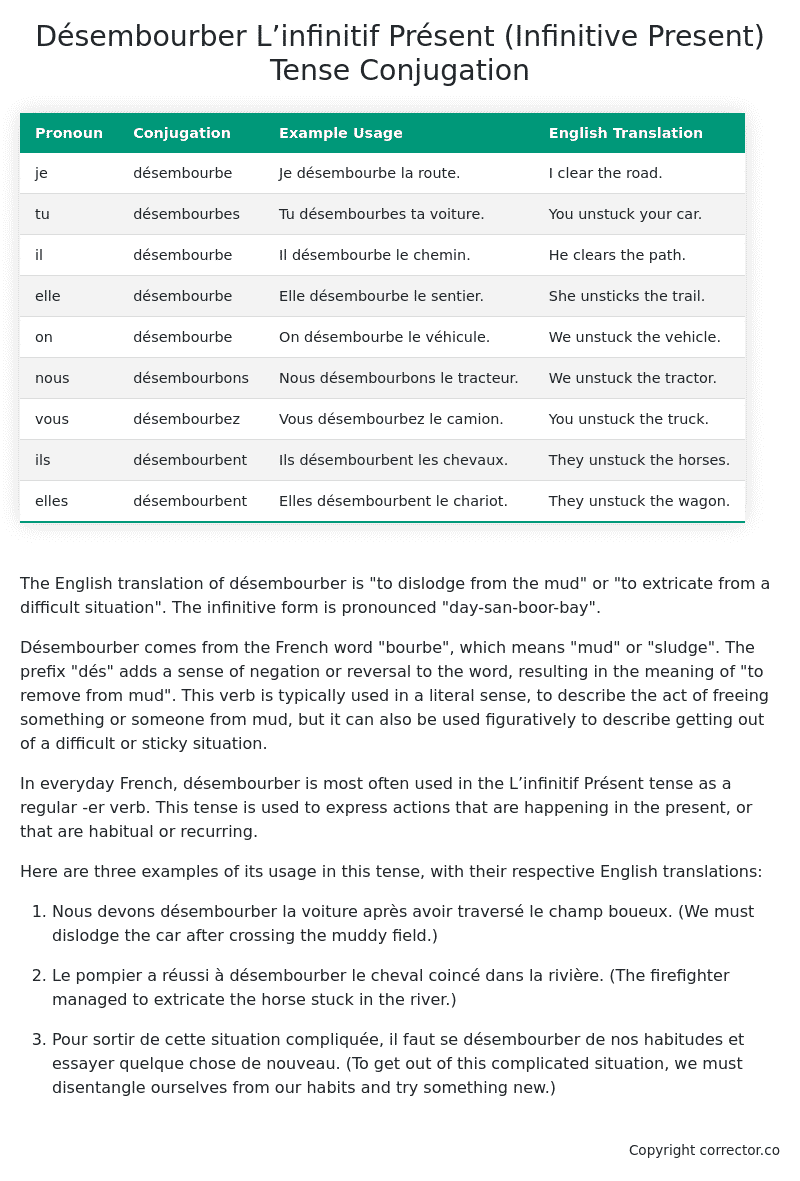L’infinitif Présent (Infinitive Present) Tense Conjugation of the French Verb désembourber
Introduction to the verb désembourber
The English translation of désembourber is “to dislodge from the mud” or “to extricate from a difficult situation”. The infinitive form is pronounced “day-san-boor-bay”.
Désembourber comes from the French word “bourbe”, which means “mud” or “sludge”. The prefix “dés” adds a sense of negation or reversal to the word, resulting in the meaning of “to remove from mud”. This verb is typically used in a literal sense, to describe the act of freeing something or someone from mud, but it can also be used figuratively to describe getting out of a difficult or sticky situation.
In everyday French, désembourber is most often used in the L’infinitif Présent tense as a regular -er verb. This tense is used to express actions that are happening in the present, or that are habitual or recurring.
Here are three examples of its usage in this tense, with their respective English translations:
-
Nous devons désembourber la voiture après avoir traversé le champ boueux. (We must dislodge the car after crossing the muddy field.)
-
Le pompier a réussi à désembourber le cheval coincé dans la rivière. (The firefighter managed to extricate the horse stuck in the river.)
-
Pour sortir de cette situation compliquée, il faut se désembourber de nos habitudes et essayer quelque chose de nouveau. (To get out of this complicated situation, we must disentangle ourselves from our habits and try something new.)
Table of the L’infinitif Présent (Infinitive Present) Tense Conjugation of désembourber
| Pronoun | Conjugation | Example Usage | English Translation |
|---|---|---|---|
| je | désembourbe | Je désembourbe la route. | I clear the road. |
| tu | désembourbes | Tu désembourbes ta voiture. | You unstuck your car. |
| il | désembourbe | Il désembourbe le chemin. | He clears the path. |
| elle | désembourbe | Elle désembourbe le sentier. | She unsticks the trail. |
| on | désembourbe | On désembourbe le véhicule. | We unstuck the vehicle. |
| nous | désembourbons | Nous désembourbons le tracteur. | We unstuck the tractor. |
| vous | désembourbez | Vous désembourbez le camion. | You unstuck the truck. |
| ils | désembourbent | Ils désembourbent les chevaux. | They unstuck the horses. |
| elles | désembourbent | Elles désembourbent le chariot. | They unstuck the wagon. |
Other Conjugations for Désembourber.
Le Present (Present Tense) Conjugation of the French Verb désembourber
Imparfait (Imperfect) Tense Conjugation of the French Verb désembourber
Passé Simple (Simple Past) Tense Conjugation of the French Verb désembourber
Passé Composé (Present Perfect) Tense Conjugation of the French Verb désembourber
Futur Simple (Simple Future) Tense Conjugation of the French Verb désembourber
Futur Proche (Near Future) Tense Conjugation of the French Verb désembourber
Plus-que-parfait (Pluperfect) Tense Conjugation of the French Verb désembourber
Passé Antérieur (Past Anterior) Tense Conjugation of the French Verb désembourber
Futur Antérieur (Future Anterior) Tense Conjugation of the French Verb désembourber
Subjonctif Présent (Subjunctive Present) Tense Conjugation of the French Verb désembourber
Subjonctif Passé (Subjunctive Past) Tense Conjugation of the French Verb désembourber
Subjonctif Imparfait (Subjunctive Imperfect) Tense Conjugation of the French Verb désembourber
Conditionnel Présent (Conditional Present) Tense Conjugation of the French Verb désembourber
Conditionnel Passé (Conditional Past) Tense Conjugation of the French Verb désembourber
L’impératif Présent (Imperative Present) Tense Conjugation of the French Verb désembourber
L’infinitif Présent (Infinitive Present) Tense Conjugation of the French Verb désembourber (this article)
Struggling with French verbs or the language in general? Why not use our free French Grammar Checker – no registration required!
Get a FREE Download Study Sheet of this Conjugation 🔥
Simply right click the image below, click “save image” and get your free reference for the désembourber L’infinitif Présent tense conjugation!

Désembourber – About the French L’infinitif Présent (Infinitive Present) Tense
Forming the Infinitive Present
Common Everyday Usage Patterns
As a Verb’s Dictionary Form
After Modal Verbs
As an Imperative
In Infinitive Clauses
Interactions with Other Tenses
Present Tense
Future Tense
Conditional Tense
Passé Composé
Imperfect Tense
Subjunctive and Conditional Moods
Summary
Want More?
I hope you enjoyed this article on the verb désembourber. Still in a learning mood? Check out another TOTALLY random French verb conjugation!


